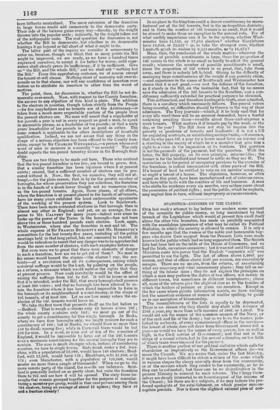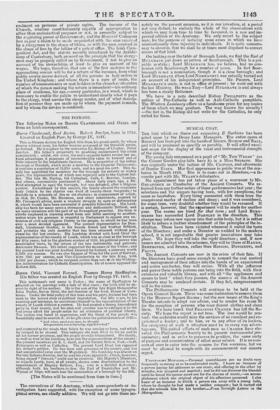STATISTICS—INCOMES OF THE CLERGY.
OUR last week's attempt to lay before our readers some account of the scramble for public money, so long maintained by that branch of the Legislature which would at present fain exalt itself above the other two branches, has made us painfully acquainted with the scandalous ignorance of what may be called its Political Statistics, in which the country is allowed to remain. It is only a few months ago that the.names of the noble and honourable beg- gars who derive their support from the Pension Lists were made known to the public which had so Iong supported them. The Scotch lists had been laid on the table of the House of Commons, and so had the Irish, on various occasions ; but it was not until the present Ministers came into power that the English "ragman's roll" was permitted to see the light. The list of offices above 1,0001. per annum, and that of offices above 2501. per annum, are exceedingly meagre. There are no means, from the returns, of ascertaining what are necessary and what unnecessary places ' - they tell us no- thing of the labour done ; ' they do not explain the principles on which a man may perform the duties of two offices, nut merely in different towns, but sometimes in different hemispheres; above all, none of the returns give the slightest clue as to the families of which the holders of pension or place are members. Except in the few cases where private information assists, we have nothing but the uncertain evidence of names of similar spelling, to guide us in our ascription of kinsmanship. The incompleteness of the lists is equally to be deprecated. There is no reason why they should stop short with incomes of 2501. a year, any more than with incomes of 5001. or 1,000/. We would not ask the names of the common seamen of the Navy, or of the rank and file of the Army ; but as we have the names, pub- lished by authority, of every commissioned officer in the service— the lowest of whom does not draw from Government above 801. a year—so would we have the names of every person, low as well as high, in the Civil service of Government ; and that not in the shape of a casual return, but in the annual estimates, on foe faith of which taxes were imposed for his paymnt.
There is another portion of our political statistics which calls for elucidation as imperatively as the Government offices do—we mean the Church. We ale aware that, under the last Ministry, it might have been difficult to obtain a return of the sums which in various shapes the clergy annually draw from the community, or of the services which they render to the community, as far as they can be estimated ; but there can be no disinclination in the present Ministry to consent to such returns. The Clergy them- selves are deeply interested in an honest expos6 of the income of the Church ; for there are few subjects, if we may believe the pro- fessed apologists of the establishment, on which greater miscon- ception prevails. Nor is there the slightest rational plea of con- cealment on pretence of private rights. The income of the Church, whether constitutionally capable of appropriation to other than ecclesiastical purposes or not, is assuredly subject to the regulating power of Government ; and the House of Commons has as just a claim to be made acquainted with the sum received by a clergyman in the shape of tithes, as with the sum received in the shape of fees by the holder of a patent office. The Irish Com- position Act, and the statute recently introduced by the Archbi- shop of Canterbury, both proceed on the principle that the clergy- man may be properly called on by Government, if not to give an account of his stewardship, at least to give an account of his wages. We hope, therefore, that one of the first motions in the approaching session will he for a return of the incomes, from what public source soever derived, of all the persons in holy orders in the United Kingdom ; and where there is a cure of souls, the number of communicants or seat-holders in the church or churches of which the person making the return is incumbent—his ordinary place of residence, his age,—every particular, in a word, which is necessary to enable the public to understand clearly what it pays to the clergy, what service the clergy render, and of what descrip- tion of persons they are made up to whom the payment is made, and by whom the service is rendered.



























 Previous page
Previous page